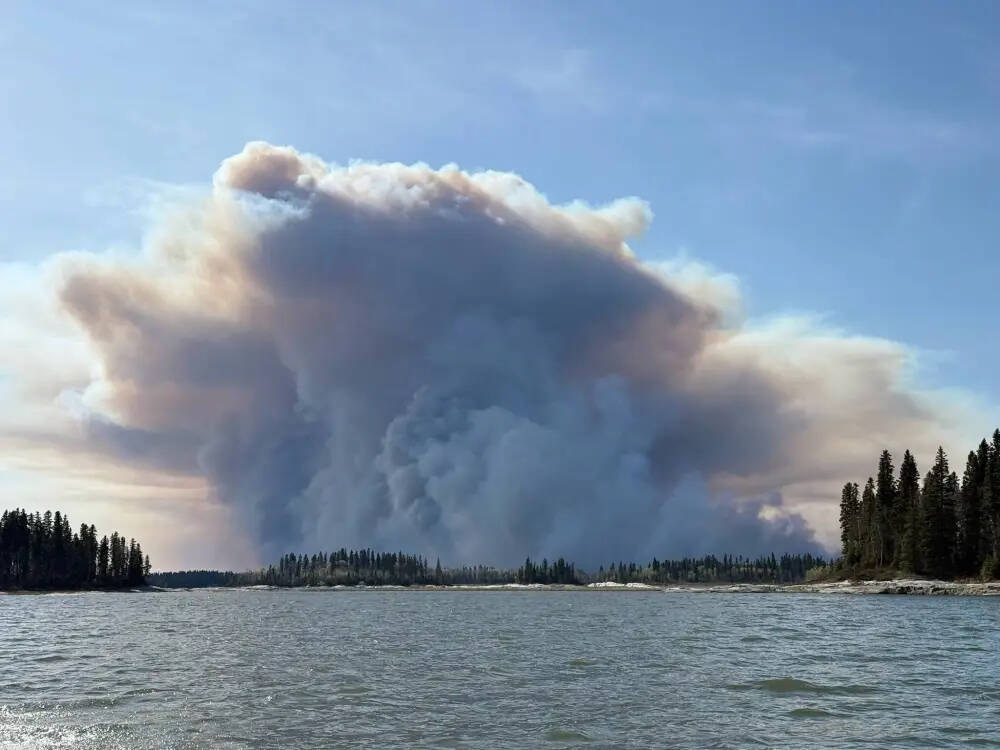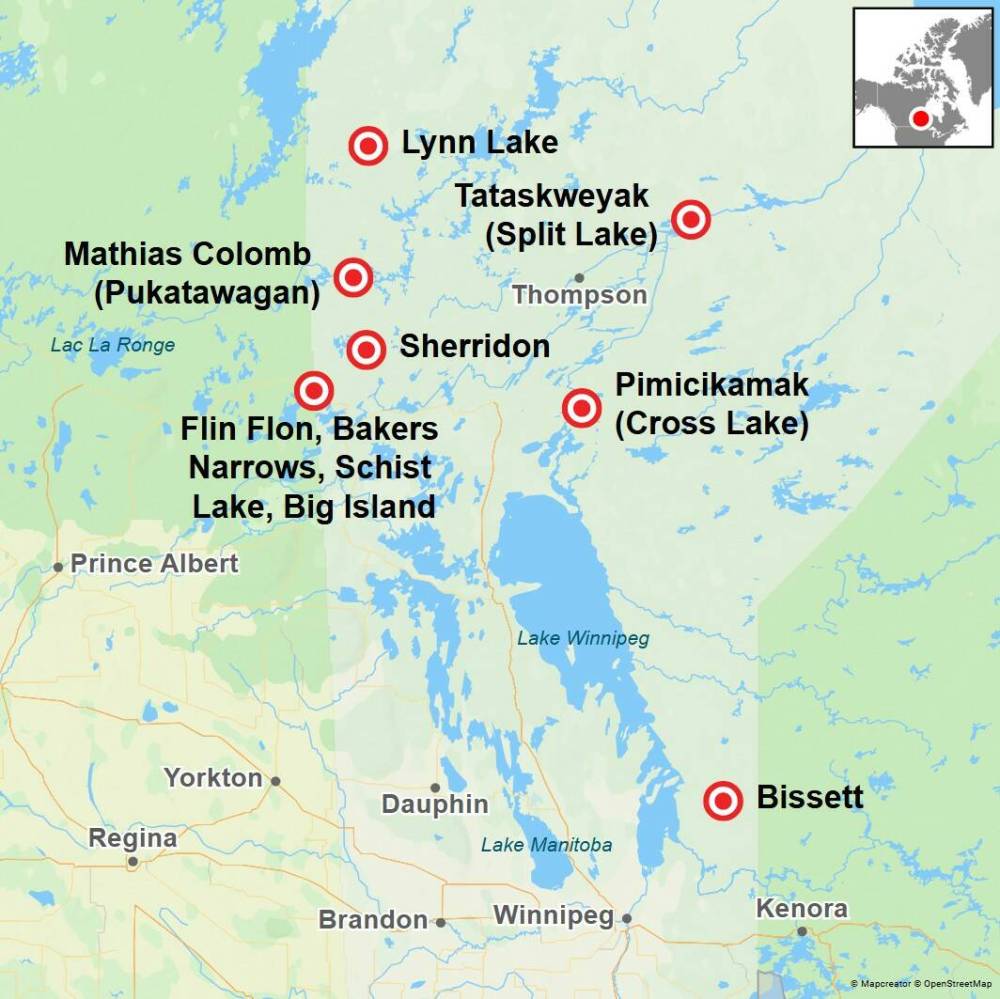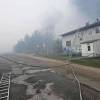‘Why do we have to beg?’: desperate chiefs plead for firefighting resources
Crews battling Manitoba wildfires with ‘garden hoses’
Advertisement
Read this article for free:
or
Already have an account? Log in here »
To continue reading, please subscribe:
Monthly Digital Subscription
$0 for the first 4 weeks*
- Enjoy unlimited reading on winnipegfreepress.com
- Read the E-Edition, our digital replica newspaper
- Access News Break, our award-winning app
- Play interactive puzzles
*No charge for 4 weeks then price increases to the regular rate of $19.00 plus GST every four weeks. Offer available to new and qualified returning subscribers only. Cancel any time.
Monthly Digital Subscription
$4.75/week*
- Enjoy unlimited reading on winnipegfreepress.com
- Read the E-Edition, our digital replica newspaper
- Access News Break, our award-winning app
- Play interactive puzzles
*Billed as $19 plus GST every four weeks. Cancel any time.
To continue reading, please subscribe:
Add Free Press access to your Brandon Sun subscription for only an additional
$1 for the first 4 weeks*
*Your next subscription payment will increase by $1.00 and you will be charged $16.99 plus GST for four weeks. After four weeks, your payment will increase to $23.99 plus GST every four weeks.
Read unlimited articles for free today:
or
Already have an account? Log in here »
Hey there, time traveller!
This article was published 03/06/2025 (195 days ago), so information in it may no longer be current.
First Nations hit by wildfires pleaded with the federal and Manitoba governments to send additional equipment and resources, while dozens more people were forced to flee northern communities Tuesday.
Mathias Colomb Cree Nation, also known as Pukatawagan, has two fire trucks but no high-volume water pumps and hoses for ground crews working to protect structures, Chief Gordie Bear told a news conference in Winnipeg via video.
“(We have) one-inch hoses. They’re no bigger than a garden hose,” Bear said remotely from The Pas, where some evacuees are staying. “We have nothing but hoses for our gardens. Nothing to fight fire with. We’re vulnerable. We have to run all the time.”
As of Friday, the fire near Pimicikamak Cree Nation had burned about 1,500 hectares. (Submitted)
A roughly 10,000-hectare fire is out of control east of the community.
David Monias, chief of Pimicikamak Cree Nation at Cross Lake, said his community has one fire truck and not enough water pumps, despite requesting more equipment.
“For a community of 10,000 people, that’s ridiculous,” Monias, appearing via video from Pimicikamak, said about the lone fire truck. “We have a state of emergency provincewide and we’re still fighting for resources, when they should be coming readily. They should be providing those things to us. Why do we have to beg?”
He said government bureaucracy or jurisdictional issues delayed the response to Pimicikamak’s crisis.
“When it comes to our homes and our lands, it’s like they’re left all by themselves,” Monias said. “It’s like our lives don’t matter.”
A Manitoba government spokesperson said the Office of the Fire Commissioner and an urban search and rescue team have been setting up sprinklers and fighting fires alongside local firefighters in First Nations communities.
How to help
Want to donate money and supplies or volunteer your time to assist fire evacuees? We’ve compiled a list of organizations; find it online at wfp.to/howtohelp
Pumps were provided to Mathias Colomb, while Pimicikamak’s request for a fire truck is being reviewed, the spokesperson said.
They said officials from the fire commissioner office and the Manitoba Wildfire Service are in daily contact with local fire authorities to assess equipment and personnel needs.
Water bombers and helicopters have been used “extensively” whenever and wherever possible in the north, the spokesperson said.
“It would be accurate to say significant fire suppression efforts have been deployed wherever there is a fire in Manitoba, including those impacting First Nations,” the spokesperson wrote in an email.
Indigenous Services Canada has not said how it will respond to the call for help. Nine First Nations in Manitoba have been evacuated, said ISC spokesman Eric Head.
He said emergency management is a shared responsibility between federal and provincial governments, and partners, including Indigenous leadership and the Canadian Red Cross.
In most cases, Ottawa does not have jurisdiction to intervene until a province or territory requests help, Head said.
More than 17,000 Manitobans have been displaced by wildfires this season.
Manitoba communities under mandatory evacuation orders. 
As of Monday, the Red Cross had registered more than 14,300 people from more than 5,400 households, the province reported late Tuesday afternoon.
About 7,000 Pimicikamak residents and 2,400 Mathias Colomb residents were ordered to leave their homes May 28, the same day the Manitoba government declared a provincewide state of emergency and sought help from the federal government.
Bear said about 50 essential workers, including firefighters, were still in Mathias Colomb. The province said the evacuation of Mathias Colomb has been completed.
A Canadian Armed Forces Lockheed C-130 Hercules flew to Cross Lake’s airport Tuesday to transport remaining Pimicikamak residents to Winnipeg.
Monias told the Free Press about 50 residents and 66 emergency-management team members remained before the plane arrived.
“We are scrambling to get the remaining people out,” he said.
Later, in a Facebook post, he said boats were available in case any remaining residents have to flee.
The military said that as of the end of day Monday, its members had airlifted more than 3,500 Manitobans since May 29.
Some Pimicikamak residents did not want to leave, said Monias, who wanted the RCMP to force them to go.
Family of 50 reunited in Winnipeg
Between himself, his wife, their seven children and 34 grandchildren, Donald McLeod now has about 50 family members under one roof at the Victoria Inn on Wellington Avenue.
The entire clan arrived Monday night aboard a C-130 Hercules aircraft, flown out of Norway House after fleeing evacuation orders in their hometown of Cross Lake.
Between himself, his wife, their seven children and 34 grandchildren, Donald McLeod now has about 50 family members under one roof at the Victoria Inn on Wellington Avenue.
The entire clan arrived Monday night aboard a C-130 Hercules aircraft, flown out of Norway House after fleeing evacuation orders in their hometown of Cross Lake.
“It’s pretty tough for many people leaving Cross Lake, and very hard for the kids, too,” McLeod said. “They don’t like being in the city, I guess. They’re used to their hometown.”
McLeod admitted he initially planned to stay behind.
“They found me,” he said with a small smile.
“It wasn’t that dangerous when it started, but yesterday it was worse. It looked dangerous. A red sky,” he said.
McLeod said it wasn’t the first time he had to leave his home behind. He was evacuated from Cross Lake in 1988, and just last year for a few days.
“This one is worse,” he said.
Madeline, his wife, said the accommodations at the Victoria Inn have been good, and Canadian Red Cross has been feeding them.
“They’re taking care of us,” she said.
— Scott Billeck
RCMP spokesman Sgt. Paul Manaigre said officers were told late Monday some residents were hiding to avoid the evacuation.
“Since being notified, the officers have been working closely with First Nation safety officers to locate these individuals and to get them to safety,” he wrote in an email.
The Manitoba Wildfire Service reported 27 active wildfires. Of those, 11 were out of control, including two in the Cross Lake area.
The largest fire, at almost 200,000 hectares, was near Bird River and Nopiming Provincial Park.
About 5,000 people were forced to leave Flin Flon last week due to an out-of-control fire that has grown to about 40,000 hectares.
Mayor George Fontaine said Flin Flon was being threatened “in all directions” while firefighters continued to protect the city.
“We’re still standing, but it’s tentative right now,” said Fontaine, who is staying with family in Winnipeg. “My heart goes out to all the people, everybody in the north, who have had to move.”
No structures in Flin Flon were lost as of Tuesday afternoon. Airport staff were forced to leave for their safety, the city’s Facebook page said.
York Factory First Nation began an evacuation involving about 110 people with medical conditions Monday. The evacuees were being flown to Winnipeg to stay in hotels.
The Town of Snow Lake declared a state of local emergency and issued a 48-hour evacuation alert as a precaution Tuesday due to a wildfire in the area.
Snow Lake was home to about 1,090 people as of the 2021 census.
Thousands of evacuees from northern Manitoba are in Winnipeg and surrounding communities, where they are staying in hotels or emergency shelters overseen by the province and Canadian Red Cross in locations such as hockey arenas.
Winkler’s Meridian Exhibition Centre is on standby, with more than 200 cots set up, in case other sites fill up.
“We’re completely ready to go, if needed,” Mayor Henry Siemens said.
Number of Manitoba wildfire evacuees so far:
These are rough estimates of the number of wildfire evacuees from some of the communities that have been fully or partially evacuated so far in Manitoba, as per figures provided by local leaders or census population estimates:
These are rough estimates of the number of wildfire evacuees from some of the communities that have been fully or partially evacuated so far in Manitoba, as per figures provided by local leaders or census population estimates:
- Pimicikamak Cree Nation: 7,000
- Flin Flon: 5,000
- Tataskweyak Cree Nation: 2,400
- Mathias Colomb First Nation (also known as Pukatawagan): 2,200
- Lynn Lake: 600
- Cranberry Portage: 430
- Marcel Colomb First Nation: 300
- Bissett: 115
- York Factory First Nation: 110 residents with medical conditions
- Sherridon: 85
- Nopiming Provincial Park: 40 permanent residences
The Manitoba government has not provided totals per community because the numbers fluctuate greatly and are only based on the number of people who register, a spokesperson said.
People who stay with family or friends, for example, may not register as evacuees, as opposed to those who visit evacuation reception centres and are put up in hotels or temporary shelters.
As of Monday, the Canadian Red Cross has registered more than 14,300 evacuees from more than 5,400 households.
The city was informed twice over the weekend that evacuees could be sent there, triggering preparations, but in both situations the evacuees were taken elsewhere. A caterer began preparing food, which would not have gone to waste, Siemens said.
A provincial spokesperson said the government’s priority is to keep evacuees together and as close to Winnipeg as possible, with as many people in hotels as possible.
Hundreds of evacuees were expected to be flown to the Hamilton and Niagara regions in Ontario to stay in hotels.
Assembly of Manitoba Chiefs Grand Chief Kyra Wilson raised concerns about evacuees’ safety in centres such as Winnipeg. She said people could be exploited by predators, human traffickers or drug dealers.
“We need to keep our people safe. They are vulnerable right now,” Wilson said.
The province closed Grass River and Wekusko Falls provincial parks Tuesday due to nearby fires.
The following areas of Whiteshell Provincial Park reopened to permanent residents, cottagers and commercial operators: Caddy Lake blocks 6,7 and 8; Island Block; Green Bay Resort; and West Hawk Lake (McDougall’s Landing, Big Island Landing and Indian Bay). A 5,000-hectare fire burned along the Manitoba-Ontario boundary.
— with files from Tyler Searle
chris.kitching@freepress.mb.ca

Chris Kitching is a general assignment reporter at the Free Press. He began his newspaper career in 2001, with stops in Winnipeg, Toronto and London, England, along the way. After returning to Winnipeg, he joined the Free Press in 2021, and now covers a little bit of everything for the newspaper. Read more about Chris.
Every piece of reporting Chris produces is reviewed by an editing team before it is posted online or published in print — part of the Free Press‘s tradition, since 1872, of producing reliable independent journalism. Read more about Free Press’s history and mandate, and learn how our newsroom operates.
Our newsroom depends on a growing audience of readers to power our journalism. If you are not a paid reader, please consider becoming a subscriber.
Our newsroom depends on its audience of readers to power our journalism. Thank you for your support.
History
Updated on Tuesday, June 3, 2025 1:38 PM CDT: Updates story, adds quotes, changes headline
Updated on Tuesday, June 3, 2025 4:40 PM CDT: Adds quotes, details, deck.
Updated on Tuesday, June 3, 2025 6:35 PM CDT: Adds fact boxes, details.















